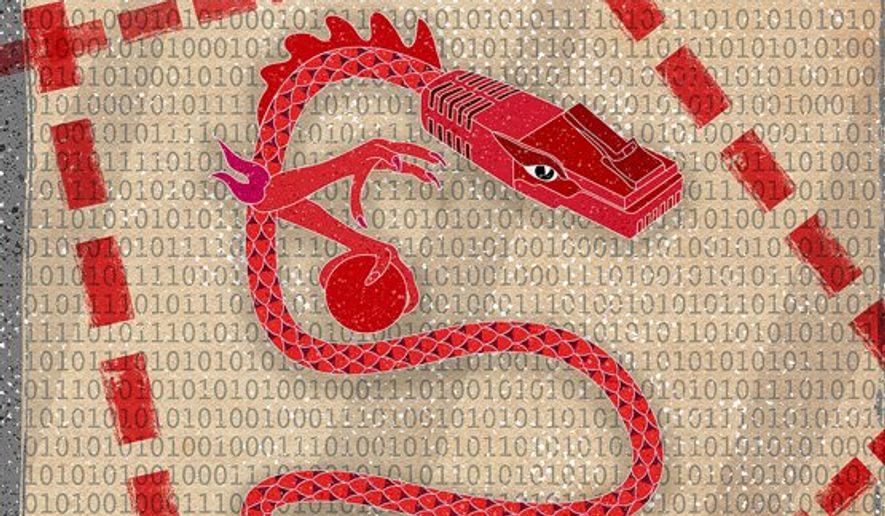OPINION:
President Trump is apparently of two minds about China. He wants to revive the moribund trade agreement he made with Chinese President Xi Jinping in January which, by greatly increasing China’s purchase of U.S. farm products, could increase Mr. Trump’s reelection prospects. He also wants to stand up to Chinese aggression which is destabilizing much of Asia.
The Chinese are making it perfectly clear that he cannot have it both ways. They are trying to bully him by declaring “red lines” Mr. Trump must not cross in resisting Chinese aggression.
“Red line” threats became popular in 2012, when then-President Obama warned Syria’s Bashar Assad not to cross a “red line” by using chemical weapons. Mr. Obama said that there would be “enormous consequences” if he did. But a year later, when Mr. Assad used chemical weapons against his own people, Mr. Obama did nothing. His red line was an empty threat that diminished American credibility.
Over the past several weeks, China has been drawing red lines of its own in an attempt to limit American conduct on a host of issues. Its threats demand that if we don’t accede to their demands for appeasement, they will refuse to make the purchases of U.S. farm products provided for in the January agreement. They have already fallen far behind the deal’s goals for such purchases.
China’s aggression is being seen and felt all across Asia. Its new “security law,” just imposed on Hong Kong, makes criminal any actions undermining China’s central government and “collusion” with foreign forces, either of which can mean anything China decides those terms to mean. The new law supersedes all conflicting Hong Kong laws and will be enforced by Chinese police in Hong Kong.
Chinese troops killed about 20 Indian troops in mid-June in a fight along the disputed border between the two nations in the Himalayan mountains. It was the most severe fight between the two nations since about 1975.
China is still building military bases on small islands in the South China Sea. Its navy is threatening fishing boats near the Senkaku Islands, which are very close to Japan and claimed by both Japan and China. In May, China falsely claimed to have driven off a U.S. Navy ship conducting a freedom of navigation exercise in the Paracel Islands, which are also claimed by Vietnam and Japan.
China is feeling the heat generated by America’s response. The Senate, for example, unanimously passed a resolution to impose sanctions on Chinese officials, banks and businesses that help undermine Hong Kong’s already thin autonomy. In June, Mr. Trump signed a bill imposing sanctions on Chinese officials and entities responsible for the mass detention of Uighur Muslims.
In a recent Hawaii meeting with Secretary of State Mike Pompeo, Chinese diplomats offered strong rebukes to these U.S. responses and made their statement of red lines that the U.S. must not cross, including “interference” in Hong Kong and Taiwan (which China regards as a renegade province) and the enforcing of sanctions regarding Hong Kong and the Uighur Muslims.
From the beginning of Mr. Trump’s trade negotiations with Mr. Xi, it has been obvious that China will never agree to the principal U.S. demand, which is to cease its China’s decades-long cyber-espionage campaign against U.S. military and intelligence agencies and commercial entities. By that means, China steals hundreds of billions of dollars’ worth of secrets and other intellectual property every year. There is no chance whatever that China will cease that campaign.
China may be confusing Mr. Trump’s desire for reelection with what they may believe is his willingness to appease Chinese aggression. In recent weeks, both Mr. Pompeo and National Security Adviser Robert O’Brien have strongly criticized China’s actions. There is little reason to believe that they do not speak for the president.
Mr. Trump obviously desires a further and better trade deal with China. But that desire has been greatly overstated. In former National Security Adviser John Bolton’s book, he wrote that Mr. Trump pleaded with Mr. Xi to purchase of U.S. farm products. Mr. Bolton’s account has been called entirely false by Special Trade Representative Robert Lighthizer, who was a party to that conversation.
Whatever Mr. Xi wishes to believe about Mr. Trump’s desire for reelection and all the publicity about Mr. Bolton’s book, both have to be placed in context with Mr. Trump’s actions in pulling America out of two treaties with Russia, the Intermediate-Range Ballistic Missile treaty and the treaty on Open Skies. Both demonstrate Mr. Trump’s willingness to walk away from bad deals.
Red China’s red lines should be ignored by Mr. Trump because any other course of action would amount to appeasement of Chinese aggression. Whatever functionality remains in the phase one deal between Mr. Trump and Mr. Xi, China’s purchase of U.S. farm products, while helpful to both nations’ economies, is not worth trading for our support of Hong Kong, Taiwan, India and the Chinese Uighurs, far less our own military and commercial secrets. The president should cancel Hong Kong’s special trade status, which was predicated on its newly-cancelled autonomy.
Every major economy in the world has been severely damaged by the COVID-19 pandemic, China’s more than most. Because of China’s accelerating aggression and its economic weakness, there is no better time to keep the heat on China.
• Jed Babbin, a deputy undersecretary of Defense in the George H.W. Bush administration, is the author of “In the Words of Our Enemies.”




Please read our comment policy before commenting.